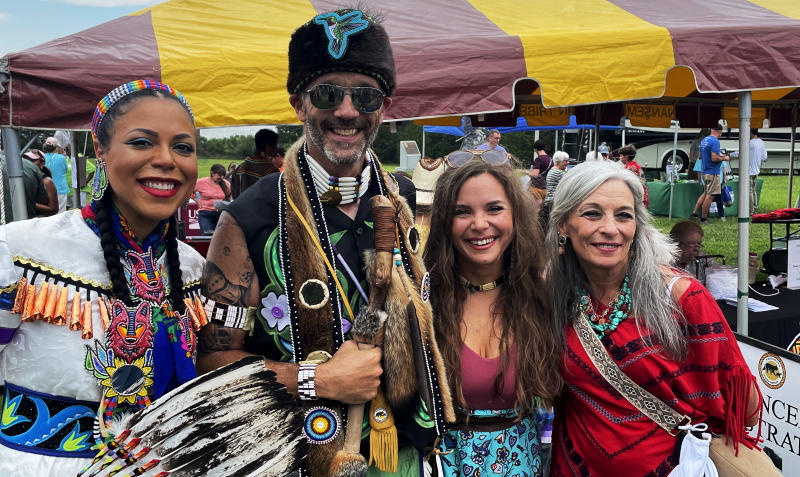On Wednesday, March 20th, 2025, students of Jahrgangsstufe EF had the chance to experience something truly special: a video call with a member of a Native American tribe. David Darling, a citizen of the Nansemond tribe based in Virginia, shared insights into the history and culture of his people and the students were able to ask questions.

English text
The Nansemond Indian Nation is a Native American tribe from the area around the Nansemond River and Chesapeake Bay in Virginia. The name “Nansemond” means “fishing point,” reflecting the tribe’s deep connection to fishing and their reliance on the river for sustenance. They were part of the Powhatan Confederacy and spoke the Algonquian language. In the past, they relied on fishing, hunting, and farming for their livelihood. Over time, they faced significant hardships, including being forcibly removed from their land. Today, the Nansemond Nation is federally recognized and actively works to preserve its culture, provide for its citizens and protect the environment.
During the one-hour conversation, David addressed the challenges of maintaining cultural identity as Native Americans. He showcased special items, including traditional regalia and cultural artifacts made from natural materials like oyster shells and eagle feathers, explaining their significance and use. The students gained a deeper understanding of modern life for Native Americans and the differences between tribes based on their history, geographic locations and traditions. David also mentioned that his tribe was among the first to encounter European settlers in the early 1600s.
He spoke candidly about the harsh realities of life for tribal citizens who live on reservations in the American plain states and American west. However, he highlighted that many tribes have found ways to generate income, such as operating casinos, building healthcare systems or investing in operating businesses. David explained that laws now exist to protect Native Americans, and although his tribe’s language has been lost, cultural heritage continues to be passed down generationally. He also participates in powwows and celebrations with other tribes, which help preserve their traditions.
When asked about his final message, David expressed deep gratitude for the students’ attention and interest in his people’s history and culture.
All in all, it was a fascinating afternoon that inspired deep thought and reflection. Thank you, David—we wish you and your people all the best!
Deutscher Text
Am Mittwoch, den 20. März 2025, hatten die Schüler der Jahrgangsstufe EF die Möglichkeit, etwas wirklich Besonderes zu erleben: eine Videokonferenz mit einem Mitglied eines amerikanischen indigenen Stammes, dem die Schülerinnen und Schüler Fragen stellen durften. David Darling, ein Angehöriger des Nansemond-Stammes aus Virginia, gewährte Einblicke in die Geschichte und Kultur seines Volkes.
Die Nansemond Indian Nation ist ein Stamm der amerikanischen Ureinwohner*innen aus dem Gebiet rund um den Nansemond River und die Chesapeake Bay in Virginia. Der Name »Nansemond« bedeutet »Fischpunkt« und spiegelt die enge Verbindung des Stammes zum Fischfang und seine Abhängigkeit vom Fluss wider. Sie gehörten zur Powhatan-Konföderation und sprachen die Algonkin-Sprache. In der Vergangenheit lebten sie vom Fischfang, der Jagd und der Landwirtschaft. Mit der Zeit waren sie jedoch erheblichen Schwierigkeiten ausgesetzt, darunter die Zwangsumsiedlung aus ihrem Land. Heute ist die Nansemond Nation bundesstaatlich anerkannt und setzt sich aktiv für den Erhalt ihrer Kultur, die Unterstützung ihrer Bürger*innen und den Schutz der Umwelt ein.
Während des einstündigen Gesprächs sprach David über die Herausforderungen, die mit der Bewahrung der kulturellen Identität als amerikanische Ureinwohner*in verbunden sind. Er zeigte besondere Gegenstände, darunter traditionelle Kleidung und kulturelle Artefakte aus natürlichen Materialien wie Austernschalen und Adlerfedern, und erklärte deren Bedeutung und Verwendung. Die Schüler*innen gewannen ein tieferes Verständnis für das moderne Leben der amerikanischen Ureinwohner*innen sowie die Unterschiede zwischen den Stämmen in Bezug auf ihre Geschichte, geografischen Standorte und Traditionen. David erwähnte auch, dass sein Stamm zu den ersten gehörte, die im frühen 17. Jahrhundert auf europäische Siedler*innen trafen.
Er sprach offen über die schwierigen Lebensbedingungen für Stammesangehörige, die in Reservaten in den amerikanischen Prärien oder im Westen der USA leben. Doch er betonte, dass viele Stämme Wege gefunden haben, Einkommen zu erwirtschaften, beispielsweise durch den Betrieb von Kasinos, den Aufbau von Gesundheitssystemen oder Investitionen in Geschäftsbereiche. David erklärte, dass es mittlerweile Gesetze gibt, die die Ureinwohner*innen Amerikas schützen, und obwohl die Sprache seines Stammes verloren gegangen ist, wird das kulturelle Erbe weiterhin von Generation zu Generation weitergegeben. Er selbst nimmt auch an Powwows und Feiern mit anderen Stämmen teil, die zur Bewahrung der Traditionen beitragen.
Auf die Frage nach seiner abschließenden Botschaft drückte David seine tiefe Dankbarkeit für die Aufmerksamkeit und das Interesse der Schüler*innen an der Geschichte und Kultur seines Volkes aus.
Insgesamt war es ein faszinierender Nachmittag, der zum Nachdenken und zur Reflexion anregte. Vielen Dank, David – wir wünschen dir und deinem Volk alles Gute!